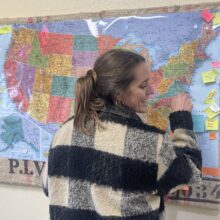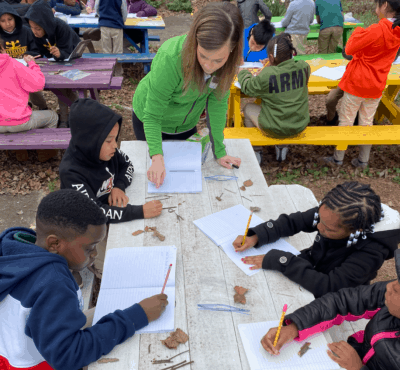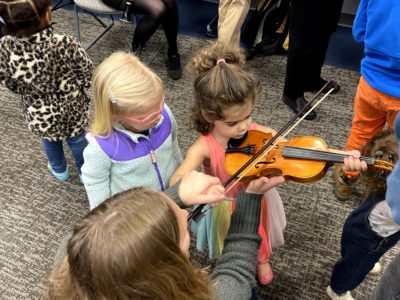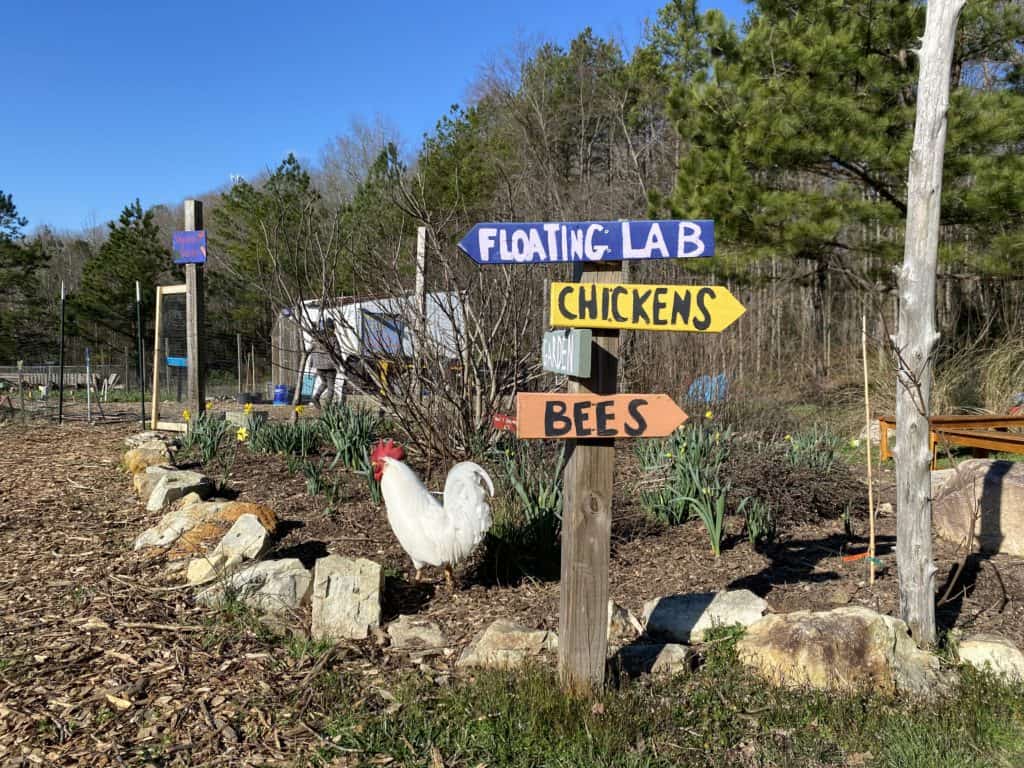

On the first weekend of March, I found myself on a sunny Saturday surrounded by two troops of girls scouts and a handful of other adults at the Hub Farm in Durham. The girl scouts were there for a service project to earn a badge, and I was there along with other volunteers to get my hands in some dirt.
With 30 acres in Durham county, the Hub Farm is part of the Durham Public School system. The mission is to “improve the academic achievement and well-being of students in Durham Public Schools through experiential outdoor learning.”
Once a month they hold a weekend “work day,” where anyone from the community can come help with farm maintenance. Throughout the week, the farm, forest, and aquatic educational center is teeming with students. I spoke with Ashley Meredith, program coordinator at the Hub Farm, to learn a little more about their history and how it is making a difference for all Durham public school students. See our conversation below, edited for length and clarity.
Parker: Can you give me a little of the history of the Hub Farm?
Meredith: Originally the land was cared for by the Catawba and Occoneechee people. Sometime after that the Carrington family owned the land.
George Carrington was a surgeon and philanthropist in the area, and he ended up donating a bunch of the land that surrounds the Hub to Durham county around 1960. The land was then used in the 80s and 90s by Durham Public Schools through Northern High School’s agricultural program. The masonry students built the barn, and they stocked fish in the pond, and they had goats, and maybe cattle on the farm. Then that program ended in the 90s, so they kind of forgot about the barn and the land.
Then back around 2010 they realized that this land belonged to DPS so they said, “let’s come up with a way to use it. There’s a barn there maybe it could be a farm.” And so the idea was formed that they would use this land to serve as a hub to connect DPS students and the community to food, environmental education, and being outside.
The early years were about building infrastructure so building a porch on the barn, getting a floor in the barn, getting a garden shed, building chicken coops, and actually building the garden. Then the past couple years we’ve been shifting more towards building out our program offerings, over time.
Parker: How often are students at the farm and what types of things do you teach at Hub?
Meredith: It’s a little bit quieter in the fall, but in the springtime we have about four big field trips come here a week and then we’ll often have probably two or three classes a week come out.
As for programs, we kind of organize the groups that we see into a couple different categories. One group that we see does service learning, so kind of just like our work days, but we do it with 25 to 50 middle schoolers. They come out, and they get to do farm tasks and learn different hard skills as well as soft skills on the farm.
Then we have hands on career learning with high school career and technical education — we call it CTE classes. They have horticulture, animal science, and culinary, and they all do different things on the farm. Culinary is doing a semester-long project where they are growing the food that they’re going to serve at a fundraising dinner. Animal science works with our goats and horticulture has a lot to do with our landscaping on the property.
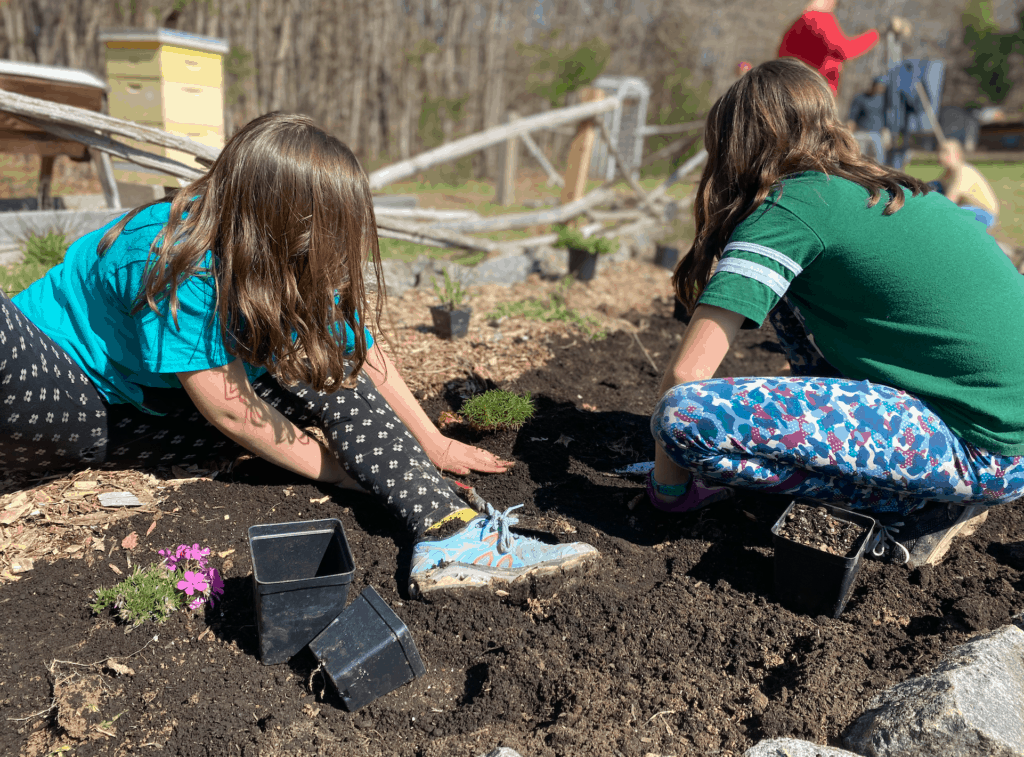

The third type of field trip is kind of a more standards-based field trip. We have two programs specifically for fifth grade science and eighth grade science. Those are their tested years for science, and they do a rotation-based field trip where the whole grade comes out or maybe half the grade at a time, and they do a rotation around the farm. They’ll learn or review different standards at stations around the farm using our pond and our forest and our garden — different parts of the farm can teach different things.
Parker: Can you tell me about the irrigation system you use at the farm?
So right now we use drip irrigation, and it used to come from the pond. We have since moved away from using our pond water and right now we’re using city water, and our drip irrigation system runs whenever we need it to. We turn it on and off. But it comes through emitters so it’s super efficient in terms of not a lot of wasted water.
We heard the Duke Energy Foundation is helping Hub with the irrigation system. Could you tell us more about it?
We’ve gotten a couple different grants from Duke Energy. We have a group of high school interns that helps out in the summertime, and they do green infrastructure all around Durham. That’s called the BETC program. They work with Durham county soil and water and different groups around town to help install rain gardens and cisterns. They would help us this summer kind of revamp our irrigation system.
And then we also got another grant from Duke Energy, and that grant was through Friends of the Hub Farm, and they are helping support a big pond project. There were three ponds originally on the property that were used for cattle, irrigation, and watering. And one of them drained I believe in Hurricane Fran, and then the second one drained in the fall of 2018 unexpectedly. And we’ve gotten a bunch grants to redo that area so we’re going to regrade it so that it gently slopes down from our pavilion area and towards a water feature.
Parker: When the second pond drained unexpectedly we heard some students stepped up to the plate. Can you tell us more about that?
Meredith: So when we first noticed it was draining and figured out that we couldn’t stop it, our high school students that are in an outdoor education class that sometimes practice fly fishing at the farm, they used their fishing poles, and fished out as many big fish out of the upper pond as they could to try and save them. They would run them down in five gallon buckets to the lower pond and release them there.
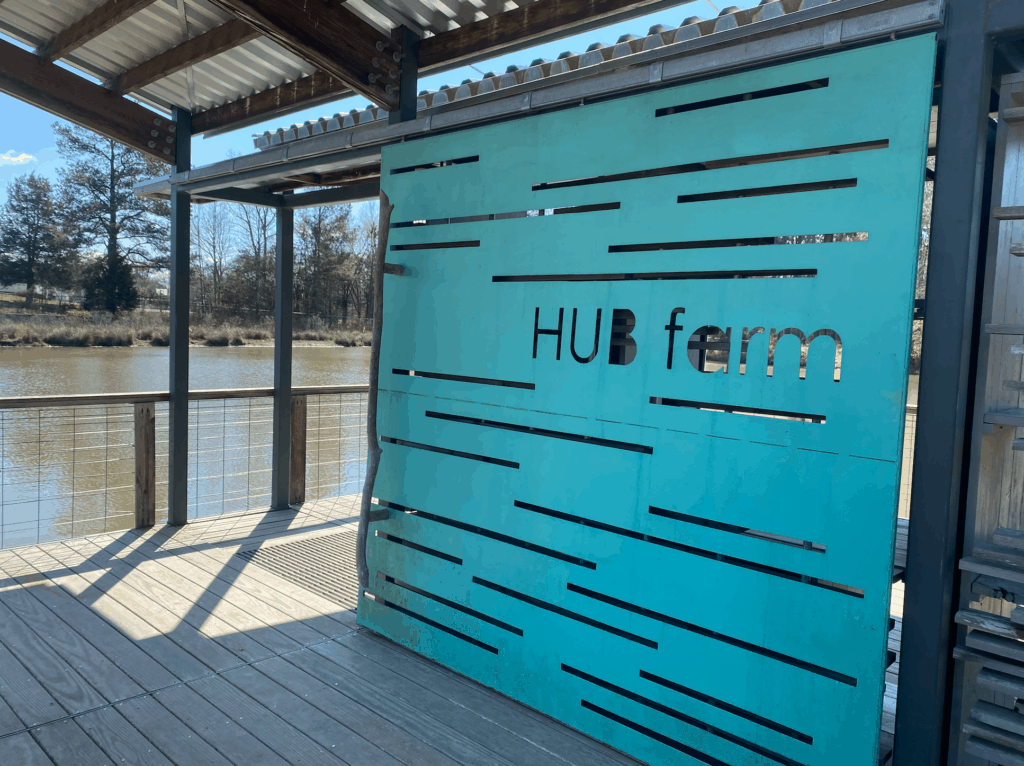

Parker: What is the thing that surprises students the most when they visit?
Meredith: I think a lot of times they’re surprised by which parts of being outside they liked. I hear a lot of kids that are like, “Oh, I never knew that a radish grew in the garden, or I didn’t know a carrot was a vegetable.” Lots of little things like little realizations that they walk away with, that I think are impactful in the long term.
Parker: What is one thing you would want people to know about the Hub farm?
Meredith: I think that I’d like them to know that we’re here. And that, we’re here for all of Durham public school students. And it’s not just science or environmental science that we can serve, it’s supposed to be an interdisciplinary place where lots of different kinds of instruction and learning goes on.
Editor’s note: Duke Energy supports the work of EducationNC.

